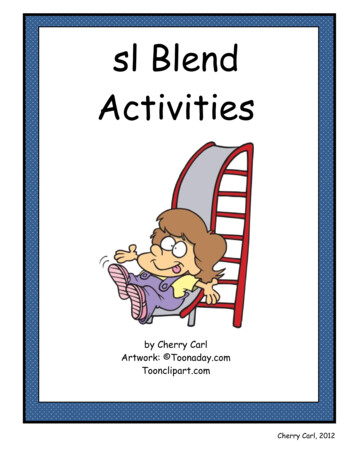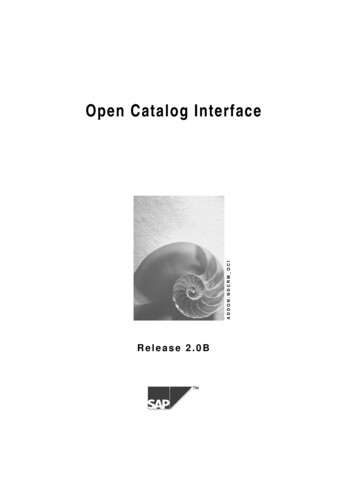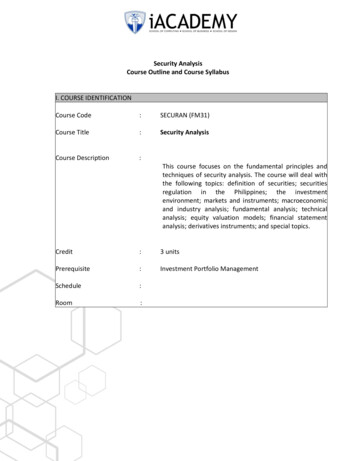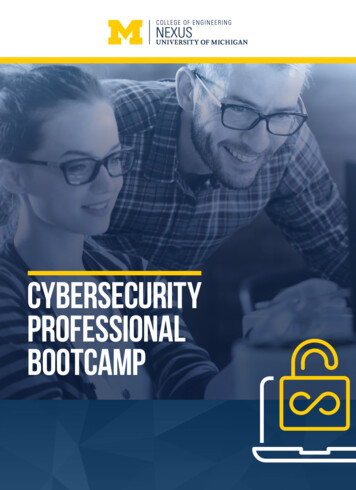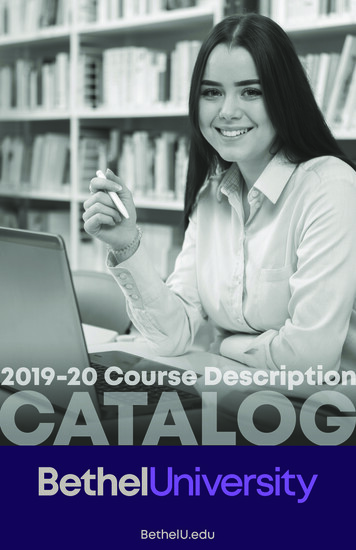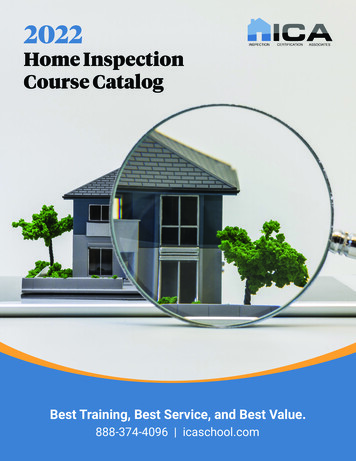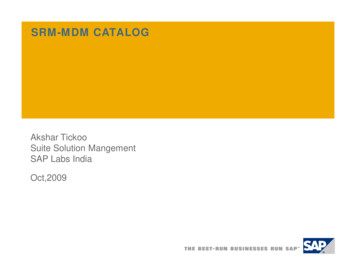
Transcription
Put down the course catalog and pick up a paint brush - it's time for Paint Night!Have you always wanted to try your hand at painting but never had the chance? Under the tutelage ofseasoned painter and longtime NACADA member Sandy Waters (Old Dominion University), you'll receive stepby-step instruction and leave with a one-of-a-kind creation. All supplies will be provided. No charge, butdonations to support the conference's chosen Penny Wars charity are requested and will be collected at thedoor.
Thursday Poster SessionsTransforming Transfer: Enriching First Semester Transfer Experiences (967)Lenora Thorbjornsen, Old DominionWith an ever increasing focus on student retention and degree completion advisors across the nationare finding it necessary to develop new strategies to engage students in their education and develop astronger campus community. Of specific concern are populations with historically low levels ofengagement; transfer students often report feelings of disconnectedness and confused during their firstsemester(s) on a new campus. This presentation will place focus on the current standards for bestpractice and new strategies for transfer student specific advising interventions. A discussion of currentresearch and program design will be presented along with strategies for implementing social media inthe advising process.Thursday Poster SessionsCreating the Constant: Developing Meaning in Academic Advising Relationships (1250)George Marshall Jr, BridgewaterOur student population is looking for meaning to be created in their experiences. In creating meaning,we are creating a consistency with the student, which is essential in developing a trusting relationship.Students may have only one constant relationship in their college career; their Academic Advisor. TheAcademic Advisors role in higher education will be that of intentional individualized relationshipsfocused on developing trust with students as well as with campus resources. How do we create thisconsistent meaningful relationship? In this poster presentation, we will discuss best practices indeveloping the important role of the Academic Advisor being the “The Constant”.Thursday PosterSessionsMonument al Assessment of Peer Advising! (1261)Kimberly DuVall, James MadisonNicole Fox, James Madison UniversityMegan Mischinski, James Madison UniversityThe Psychology Peer Advising Practicum program at James Madison University is a unique programdesigned to provide advising by students trained in college and departmental academic requirements aswell as career and graduate school planning methods. Qualtrics surveys have been utilized to assess theeffectiveness and efficiency of the in-office services, as well as the usefulness of the departmentalevents and services offered. Survey questions address long-term academic and career goals helpfulness,proper referral to other support services on campus, and respectfulness towards advisees. Results haveshown positive experiences. Future directions in assessment will be discussed to include assessment ofthe Psychology Peer Advisors’ overall practicum experience with pre-test and post-test data measuringboth advising knowledge and leadership skills and abilities.Thursday Poster Sessions
When should a student return after dismissal? The reinstatement process at the University ofMaryland (1262)Paulanne Walker, UMD College ParkPeter DeCrenscenzo, University of Maryland, College ParkReenrollment is required of any University of Maryland student who takes time off or was academicallydismissed from the university. The Student Success Office (SSO) coordinates the application process bypreparing application materials for review by the Faculty Petition Board (FPB). Using an onlineworksheet system SSO is able to enter in relevant information regarding the student’s record so that aninformed decision can be made by the FPB. There are a variety of decisions, including completing creditsat another institution or time away, that a student can receive. In this session, participants will learnabout how UMD incorporates advising practices in the reenrollment process, how the process iscoordinated across multiple offices, and how online tools facilitate the process that helps studentsreceive appropriate and timely decisions.“TECH WIZARDS” CAPITOL IZE ON SOCIAL MEDIA FOR PEER ADVISING (1266)Kimberly DuVall, James MadisonAllison Piotrowski, James Madison UniversityKathryn Tousley, James Madison UniversityThe Psychology Peer Advising practicum experience at James Madison University is a unique programdesigned to provide advising by students trained in college and departmental academic requirements aswell as career and graduate school planning methods. The “Tech Wizards” contribute to this program byproviding the psychology department with important information through the use of web-based andsocial media endeavors and are able to advertise for events, inform students about advising, andmonitor the number of individuals their updates have reached. Peer advisors in this practicumexperience gain transferable skills through continuous mentoring relationships. This presentation willdemonstrate the efficiency of using the web and social media to provide advising information and theadaptability of this practice to other institutional settings.Thursday Poster SessionsInstructions Included: the D.I.Y. Student Success Kit (1287)Carlos Avent, Walden UniversityBelinda Prattis, Walden UniversityThough used in the business world for some time now, one-on-one coaching is a relatively new tool forstudent engagement in academia, especially for adult online learners. By not focusing solely onacademics, Walden University’s Student Success Coaches are able to provide a holistic support paradigmfor this population, serving to help students become self-sufficient critical thinkers. Each institution’srespective coaching team will have different strategic objectives, but building a successful studentcoaching team from the ground up starts with the same essential components. This presentation seeksto identify the crucial fundamental resources for creating, implementing, and sustaining a studentsuccess coaching model for non-traditional distance learners.Thursday Poster Sessions
Student Success Programming for At Risk Students (1306)Matthew Smith, VCUInvestigating ways to raise your GPA? Have you heard about VCU STRIDE?STRIDE is a community based program spanning 7 weeks which focuses on positively reinforcingstudent’s academic accomplishments. This program develops pre-existing skills to further enhancestudent success.STRIDE students are exposed to advanced learning methods which facilitate progressive thinking.Through mindfulness, positive reinforcement, and community students will experience a transformationand expansion of their skills into “power tools”.STRIDE centers on building confidence and encourages ways to celebrate academicaccomplishments.Thursday Poster SessionsAttribution Theory: Reframing Students' Career Path (1319)Janine Warnas, TempleUsing the Attribution Theory, academic advisors and career coaches can assist students in identifyingand understanding their attributions for success or failure. By changing students’ perceptions(attributions) through reframing and retraining students’ perceptions (attributions) can determine theamount of effort that they will expend in future career activities such as using university resources,designing a career portfolio, and securing a meaningful career pathThursday Poster SessionsFirst-Generation Student Academic Advising Experiences (1359)Elizabeth Kalinowski Ohrt, George MasonFirst-generation students comprise 24% of the college student population in the United States (Engle &Tinto, 2010). However, between 1992 and 2000 only 25% of first-generation students completed abachelor’s degree compared to 68% of their peers (Chen, 2005). In the fall of 2014 three rising seniorswere interviewed regarding their academic advising experiences at a regional, Research I, university.Students were asked about whom they received academic advising from, their perceptions of advising,and how they navigated the policies and procedures of the university. Four distinct themes emergedfrom the interviews including establishing trusting relationships, demonstrating knowledge,demonstration of caring, and the strong impact of support programs. A review of findings andsuggestions for practice will be offered.
CAP - A Model of Community College Student Success (1065)8:30:00 AM - 9:30:00 AMJill Nagiel, Anne Arundel Community CollegeIn the Teacher Education program at Anne Arundel Community College, we have found that our students are mostsuccessful when they have a structured plan for degree completion. By developing a clear academic pathway - andproviding intentional support throughout the program – our aim is to recruit, engage, retain, and help students navigatethe transfer process. Find out how we support our students with an emphasis on Connecting, Advising & Planning (CAP).Start-to-Finish: How We Changed Our Advising Framework to Enhance Student-Advisor Relationships (1258)8:30:00 AM - 9:30:00 AMJennifer Clevenger, Virginia TechKatie Wells, Virginia TechOur students were only moderately satisfied with Split Model academic advising. We undertook the massive task ofrestructuring our advising model by changing the framework from a shared structure to a centralized structure. Earlyresults have shown that the move from a Split Model to a Self-Contained Model has been successful. We used a phase-inapproach to change our advising model and will share our timeline. We will discuss the keys to our success, particularlyhiring and training professional advisors. We will also discuss the benefits and challenges in changing advisingframeworks, and provide satisfaction and statistical data. There will be time for questions and answers to help otherswho may be interested in exploring a similar advising change.Peer Advising – A Creative Approach for First Year Student Success (1260)8:30:00 AM - 9:30:00 AMAnne Leibig, Neumann University“Decades of good research has determined that the single greatest influence on college student decision making duringthe college years is the influence of other students” (Newton & Ender, 2010, p. xii). This session will focus on a “hightouch” Peer Advising program, developed for a first year seminar class, with a goal of increasing student success andretention. This interactive presentation will share methods the Peer Advising Coordinator uses to teach the PeerAdvisors how to “teach” the seminar students the tools for becoming successful college students. In 2013 and 2014 thispilot program resulted in a 12.5% increase in retention when compared to a similar cohort from 2012.The Evolution of an Effective Academic Advising Association: Past, Present and Future (1304)8:30:00 AM - 9:30:00 AMSherri Watson, Old Dominion UniversityCatherine Moss, Old Dominion UniversityKeith Krepcho, Old Dominion UniversityIt is essential that academic advisors have successful professional development associations to flourish within the field.In order to effectively help students succeed, advisors must hone and develop their skillset regularly. This presentationwill examine Old Dominion University’s Academic Advising Association (ODAN) from its establishment in 2009 untilpresent -day. We will explore the successes and challenges with creating a NACADA allied association, how we supportstudent success through advisor self-care and where we anticipate to be in the future. This presentation will create acollaborative space and we invite attendees from other institutions to attend and share ideas and input regarding theirexperiences with creating an allied association on campus.
Meaningful Advising for Students in Transition (1310)8:30:00 AM - 9:30:00 AMErica Kalinowski, The College of New JerseyIvonne Cruz, The College of New Jersey“You’ve been dismissed from your major.” Although it’s a sentence that no college student ever envisions hearing, thereality is that each semester there are students who fail to meet minimum retention standards of their academicdepartments and are therefore faced with the challenge of finding new programs, sometimes rather quickly and oftenwith great resistance. As a college who operates without a centralized advising office, students in transition can be leftfeeling unsupported. At The College of New Jersey, the Center for Student Success provides continual outreach andguidance for these students with the goal of transitioning to their intended program as smoothly as possible. During thissession, we will explore current strategies that TCNJ uses for transitional students and accompanying challenges.You Have 53 Unread Messages: Strategies for Student Communication (1320)8:30:00 AM - 9:30:00 AMMatt Sinclair, The Pennsylvania State UniversityKaren Sones, The Pennsyvania State UniversityBen Whitesell, The Pennsyvania State UniversityThe digital age of communication is upon us. One would think that with the myriad of platforms and devices availablethat it would be easy to share information with students. The unfortunate reality is that this is not always the case.Why do students expect information made available to them, but then not pay attention to it? As social mediaplatforms become more available and diverse, how is it best to reach out to students? What defines a successfulcommunication effort? This roundtable discussion will include prior research, data distribution, and discussion aboutthe strategies for successful student communication.The Votes are In---Creating a Winning Campaign to Help At-Risk Students Succeed (1341)8:30:00 AM - 9:30:00 AMJackie Gabrielian, Towson UniversityElizabeth Scarbrough, Towson University"The Votes are In---Creating a Winning Campaign to Help At-Risk Students Succeed" will demonstrate a provensuccessful program that helps take students from suspension to graduation. Now in it's fifth year at Towson University,this collaborative effort between the Academic Advising Center and the Academic Achievement Center utilizes one-onone intrusive advising, online learning modules and academic coaching to create student success. Statistics related togood academic standing, graduation rates, and return on investment will be presented to highlight the program's overallsuccess rate.Motivational and Aspirational Advising: Paradigms from the Life of an Under-achiever (1362)8:30:00 AM - 9:30:00 AMForrest Pritchett, Seton Hall UniversityAcademic advisers must achieve competencies in academic advising that address the "heart and soul" of advisees.Traditional techniques and resources are not intended to "ignite the passion and fire" within an advisee, particularly,one who comes from a first generation, or inner city or a low income background and an under achieving background?The use of a story of how other individuals moved beyond the ordinary to become extraordinary may be the key to
open up an extraordinary conversation on achievement for the present and into the future. A veteran advisor will sharea story of a college student's story that resembles or is a fore telling of the modern day story of "Forrest Gumb"
The Demise of In Person Academic Advising is Nowhere in Sight (1253)9:45:00 AM - 10:45:00 AMJanice Stapley, Monmouth UniversityResearch, funded by NACADA, revealed that whether they are commuters or live on campus, mostcollege students prefer to meet in person with their advisors and use email for making appointments orasking quick questions. The 50% of the sample who meet with someone besides their assigned advisorusually chose the alternate because they were given more individual attention or had a relationship withthat person. Advisors will gain insight from questionnaire and interview data that will be shared and willlearn about applying Arnett's Emerging Adulthood Theory (focused on those who are 18-29 years old) toadvising. Suggestions for enhancing rapport and relationship building, even for those with largecaseloads, will be offered within a group discussion.Advisors Advising Advisors: Developing an Advising Workshop for New and Returning Advisors (1312)9:45:00 AM - 10:45:00 AMAnnie Laib, University of Maryland - College ParkAbby Shantzis, University of Maryland - College ParkTracy Chung, University of Maryland - College ParkAdvising is a necessity to support students on their paths through college, but it can be frustrating foradvisors and students alike when those advisors feel uninformed. In this session, we will discuss our owndevelopment and implementation of an interactive faculty advising workshop that refreshes advisors’memories of best advising practices and introduces new ones. Moreover, we will discuss how ouradvising workshop is transferable across advising settings. We will incorporate skits, other interactiveworkshop tools, and small group discussions within the session. Participants will discuss their ownadvising structures and raise questions about the applicability of advising workshops within their owninstitutions. We will provide sample resources and handouts to help participants implement their ownadvising workshops.Retaining and Graduating First Generation College Students (1314)9:45:00 AM - 10:45:00 AMShornna Berkeley, Rutgers UniversityCatrina Diggs, RutgersPetal Gadsden, RutgersResearch on low income, first generation college students found that this population of students is lessacademically prepared, has less knowledge of financial resources, experience more difficulty adjustingto college, and is more likely to work and hold other responsibilities outside of college(Engle & Tinto,2008). This workshop will focus on the comprehensive efforts to retain first generation college studentsfrom admissions to degree completion at the School of Arts and Sciences Educational Opportunity FundProgram (SAS EOF) at Rutgers University-New Brunswick. The SAS EOF Program offers targeted
recruitment initiatives, a summer bridge program, a first year seminar, developmental academicadvising, and financial aid counseling to combat barriers to college persistence and graduation of its firstgeneration college students.Capitol-izing on Leadership Development in NACADA-The Emerging Leader Program (1318)9:45:00 AM - 10:45:00 AMKimberly Smith, Virginia TechMarcus Peanort, Montgomery College (MD)Sandy Waters, Old Dominion UniversityCynthia Pascal, Northern Virginia Community CollegeAre you interested in getting more involved with NACADA leadership but not sure where to begin? Areyou overwhelmed with your options and want to gain valuable expertise from existing NACADA leaders?Are you someone who feels you have a lot to offer others? If you answered yes to any of thesequestions, then NACADA's Emerging Leader Program may be for you! The Emerging Leader program wasestablished as a way to help increase diversity in NACADA's leadership. Since its inception, it has pairedleaders with mentors, helping to shape NACADA's mission of being a global community. Attend thissession to learn about the program, achievements of mentors and leaders, and how you can getinvolved to become the best leader you can be!Stop Hiding Behind the Computer Screen! Using Sophomore Seminar to Equip Students with RealWorld Communication Skills (1322)9:45:00 AM - 10:45:00 AMAmanda Ackerman, New Jersey Institute of TechnologyAnthony Angelella, New Jersey Institute of TechnologyMichele Bell, New Jersey Institute of TechnologyGeorge Olsen, New Jersey Institute of TechnologyStudents in the New Jersey Institute of Technology’s College of Computing Sciences have majors invarious computing disciplines. Though these students have advanced technical skills, prospectiveemployers have noted that their interpersonal communication skills are often lacking. In response, thecollege’s academic advisors created a mandatory 1-credit sophomore seminar focusing oncommunication skills and professional development in preparation for obtaining co-ops and internshipsin their junior year. In this session, advisors will share their syllabus and an overview of thelessons/assignments administered in this seminar, as well as tips on how you can implement a similarseminar at your institution.
Capitalizing on Group Advising: Transforming a First Year Orientation Course through Faculty/StudentCollaboration (1339)9:45:00 AM - 10:45:00 AMRosa Zagari-Marinzoli, The College of New JerseyMaddie Anthes, The College of New JerseyJenna Krizan, The College of New JerseyAt The College of New Jersey (TCNJ), Open Option freshmen in the School of Humanities and SocialSciences (HSS) take an orientation course. The course aligns with TCNJ’s signature experiences and theHSS Advising Policy.In this presentation, the presenters, the two co-instructors and a Peer Instructor (an upper levelstudent), will outline the process for developing this team-taught course, the importance given to thePeer Instructors’ role in analyzing and assessing student feedback data, which resulted in substantialmodifications since the course’s implementation in 2001.Copies of the course syllabus and some additional material will be distributed. Attendees will take homeadaptable tools to develop a similar course and customize it to specific disciplinary needs.Let Students Take the Wheel: Using Appreciative Advising to Drive First-Year Students towardAutonomy (1343)9:45:00 AM - 10:45:00 AMMary Carmel Etienne, Trinity Washington UniversityAlecia Duncan-Thomas, Trinity Washington UniversityEva Morgan, Trinity Washington UniversityTawanna Terry, Trinity Washington UniversityHow can we support first-year students to make decisions about their college experience? In this sessionparticipants will explore ways they can use Appreciative Advising to help first-year students developautonomy during three key advising activities: registration, orientation, and advising meetings.Appreciative Advising is an approach to advising that emphasizes helping students develop selfawareness and learn to make decisions. It’s based on a practice of asking positive open-ended questionsand encourages students to make choices based on their goals and interests. Participants will leave thesession with a better understanding of Appreciative Advising, examples of how it’s being implementedin a first-year advising program, and strategies for using the model in their own advising practice.
Big Starfish, Small Pond: How Early Alert Has Enhanced High-Touch Advising at a Start-Up CommunityCollege (1360)9:45:00 AM - 10:45:00 AMJanine Harris, Stella and Charles Guttman Community College (CUNY)Patricia Payano,Stella and Charles Guttman Community College (CUNY)Dainielle Insalaco-Egan, Stella and Charles Guttman Community College (CUNY)Big Starfish, Small Pond: How Early Alert Has Enhanced High-Touch Advising at a Start-Up CommunityCollege Guttman Community College, now in its fourth year, offers a constellation of high-impactpractices to support the persistence of 800 students. Proactive, caseload advising is a centerpiece of themodel. To enhance advisors’ work and document feedback to students, Starfish Early Alert wasimplemented at scale in summer 2015. As a result, advisors are virtually "embedded" in students' inclass lives. This session will unpack advising at Guttman and situate students' experiences with Starfishwithin advising relationships. Participants will learn how Starfish is changing the advising landscape atGuttman, and they will consider the impact of an early warning system on appreciative advising, and willwork together to brainstorm taking similar measures at their campuses.Impact of Implementation of Engagement Index on Advising (1329)9:45:00 AM - 10:45:00 AMChuck McNally, Drexel UniversityRita Berson, Drexel UniversityMany universities have academic early warning systems. In the past, our institution’s retention officedistributed an early warning report based on midterm grades during the week of the course withdrawaldeadline. Most advisors believed this information arrived too late. Our Office of Institutional Researchdeveloped a data driven approach called the Engagement Index to track student progress on a week-byweek basis. Instead of just reporting grades at the midterm point, the Engagement Index is recalculatedeach week giving more up-to-date information. We will examine how the Engagement Index is beingimplemented by advisors and the impact it has had on our communications and advising meetings withour freshman students. We will also discuss potential pitfalls in implementing this system and givesuggestions for future implications.
Transforming the College Experience: Creating an Engaging Transfer Student Culture (1122)11:00:00 AM - 12:00:00 PMDaniela Cigularova, Old Dominion UniversityTania Alvarez, Old Dominion UniversityThe emphasis on the Completion Agenda and its goal of increasing the number of degrees within the USshould stimulate a shift in campus culture inclusive to the unique needs of transfer students. However,transfer students are often neglected in the pursuit of retention initiatives to improve time to degree.This presentation provides an overview of the transfer student population, identifies strategic initiatives,utilization of predictive analytics, articulation agreements and prior learning assessment processes toensure the success of transfer students at a medium-sized urban public senior institution with strongpartnerships with the Virginia Community College System. Colleagues attending this presentation willlearn about partnerships and strategies to create a transfer student culture that promotes engagement,retention, and timely graduation.Campus Collaborations: Connecting Majors and Careers (1264)11:00:00 AM - 12:00:00 PMAmanda Carcione, Montclair State UniversityAdam Mayer, Montclair State UniversityMore often than not advisors and career counselors help transitional students work through the anxietythat surrounds selecting a major or career, or avoiding that choice all together. In this session,Administrators from both Academic Advising and Career Services will facilitate a discussion on methodsfor helping students understand the nature of the major/career connection and provide concreteapproaches for helping students understand the fluidity of selecting a major or career.What do you meme I have an adviser? Speaking the language of social media to increase studentengagement (1286)11:00:00 AM - 12:00:00 PMLyndsay Durham, Virginia Commonwealth UniversityWe all experience the frustrations of students not reading our emails. So how do we communicateinformation that is critical to their success? We have to start speaking their language. By meme, Tweet,Vine, Snap, Post, or skywriter over campus - there are messages students need to see. Together we'lldiscuss how some of these communication methods were used in a unit of over 380 forensic sciencemajors at a large urban research university of 32 ,000 students. Whether using social media or not,participants will leave this session with examples of how the language of social media can be used forimmediate implementation.
Seasoning the Salad: What Are We Bringing to the Table to Contribute to the Success ofUndocumented Students? (1307)11:00:00 AM - 12:00:00 PMShelly Caldwell-Bennett, Montgomery College (MD)Immigration continues to be a hot button topic in the United States and it impacts communities invarious ways including higher education. Undocumented students are a growing population in U.S.Colleges and Universities, adding to the “cultural salad bowl” that makes up our student populations.These students often look to advisors for guidance and information on campus and communityresources. This presentation will examine facts and policies regarding undocumented students, discussstudent services and resources for students attending community college in the Washington D.C.metropolitan area, and share best practices from the literature and various institutions to helpundocumented students achieve their dreams of a college education.There’s An App For That: Syncing Mobile Applications to Academic Advising (1335)11:00:00 AM - 12:00:00 PMMadeleine DeBot, Temple UniversityCarly Doyle, Temple UniversityMobile applications are an omnipresent aspect of college students’ lives. From sharing files with facultyand classmates to sharing photos with friends and family, millennial college students stay informed andconnected with their campus and world through mobile devices. This presentation examines researchon how millennial college students send and receive information and student perceptions of mobileapplications in relation to academic performance. The presenters will share best practices andinnovative ideas on how to engage first year college students using popular mobile applications rangingfrom Instagram to Google Calendar. The audience will learn how to adapt communication and advisingpractices to changing student needs and preferences. And don’t forget your mobile device! Thispresentation incorporates interactive mobile activities.Advising Students in a Culture of Change: A Roundtable Discussion (1346)11:00:00 AM - 12:00:00 PMKeith Krepcho, Old Dominion UniversityCatherine Moss, Old Dominion UniversitySherri Watson, Old Dominion UniversityThis Millennial Generation has been characterized by constant cultural shifts in social, political, andtechnological development that have challenged the way we engage our world, our education and eachother. With the pace of change, it can be difficult to ascertain what impact the current environment-institutionally and globally-- has on our current student population. As advisors, we need to be aware ofthese current changes to effectively advise the whole student. In this session, we will facilitate a roundtable discussion about how current cultural shifts impact our advising interactions by sharing case
studies and identifying common issues and themes. W
Carlos Avent, Walden University Belinda Prattis, Walden University Though used in the business world for some time now, one-on-one coaching is a relatively new tool for student engagement in academia, especially for adult online learners. By not focusing solely on academics, Walden University's Student Success oaches are able to provide a .



